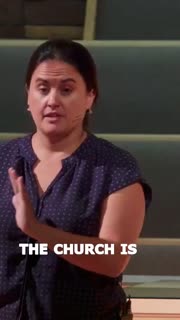Embracing Outward Focus: Serving Beyond Our Walls
Devotional
Sermon Summary
Bible Study Guide
Sermon Clips
### Quotes for outreach
1. "The church is the only institution that exists primarily for the benefit of those who are not members. How might our world be different if we actually lived into that quote, right? So what does it mean to be outwardly focused in a way that that non-members want to come in?" [37:05] (18 seconds)
2. "Any time is the right time for healing and wholeness. And I was privileged to spend a couple hours, well, gosh, what, Pastor Sharon, 12 hours? Yesterday with staff and laity at the church, and a theme kept coming up. I think Terry said it. He said, at Desert Spring, we never say no, we say, how can we help?" [38:38] (21 seconds)
3. "When you eat with someone who can't give you anything tangible in return, but can give you love and joy that's so radical and unexpected, that your life is forever changed. That's what it means to be outwardly focused and to realize." [44:32] (15 seconds)
4. "Christians can be happy and we can have fun and we can have joy. And that can be contagious when we share it with all God's children. So I don't know what brought you here today. I don't know who you identify with in this story. If you're here because you're looking for healing, because you felt like you've been kicked out of the head table." [54:24] (22 seconds)
5. "We rejoice this day to say our little lives are big problems. These we place upon your altar. We ask these things in the name of your son, our savior, Jesus Christ." [57:23] (12 seconds)
### Quotes for members
1. "The actual word in Greek for humility means to know your true worth and value, to know you are important, and to choose the importance of others above yourself. So we're not saying lose all sense of, like, love for who God has made you, but also know God loves other people too, right?" [41:34] (22 seconds)
2. "There's a difference in how you break bread together when you know that the person eating the bread wouldn't eat anything if they didn't have an invitation. And a time I was able to experience this in my life was in 2005. When my husband and I were Peace Corps volunteers in Bulgaria." [43:04] (20 seconds)
3. "What if with our rules and regulations, the constraints we set up, we're telling people they can't have access to God's table. So he brings the table to them. He invites them to join him at the feast. Sometimes those of us with power and privilege need to think about the circles we're creating and the invitations we're offering and who we are leaving out because we've missed the truth." [50:26] (22 seconds)
4. "All are invited, not all come. Why? Because of work, because of stuff, because of relationships, because those with power and privilege are not inviting everybody or because in the last example, they don't know their worth. They don't know they're really welcome and belong and can show up out of the blue and be a part of the party." [51:47] (18 seconds)
5. "They say people wait their entire lives to hear three things I love you I forgive you and supper's ready know that God is saying all three things to you in this moment and into eternity so you may share those statements with others at the feast in the kingdom of God go in the grace peace and power of God the Father God the Son and God the Holy Spirit amen amen" [01:11:56] (29 seconds)
Ask a question about this sermon
1. "The church is the only institution that exists primarily for the benefit of those who are not members. How might our world be different if we actually lived into that quote, right? So what does it mean to be outwardly focused in a way that that non-members want to come in?" [37:05] (18 seconds)
2. "Any time is the right time for healing and wholeness. And I was privileged to spend a couple hours, well, gosh, what, Pastor Sharon, 12 hours? Yesterday with staff and laity at the church, and a theme kept coming up. I think Terry said it. He said, at Desert Spring, we never say no, we say, how can we help?" [38:38] (21 seconds)
3. "When you eat with someone who can't give you anything tangible in return, but can give you love and joy that's so radical and unexpected, that your life is forever changed. That's what it means to be outwardly focused and to realize." [44:32] (15 seconds)
4. "Christians can be happy and we can have fun and we can have joy. And that can be contagious when we share it with all God's children. So I don't know what brought you here today. I don't know who you identify with in this story. If you're here because you're looking for healing, because you felt like you've been kicked out of the head table." [54:24] (22 seconds)
5. "We rejoice this day to say our little lives are big problems. These we place upon your altar. We ask these things in the name of your son, our savior, Jesus Christ." [57:23] (12 seconds)
### Quotes for members
1. "The actual word in Greek for humility means to know your true worth and value, to know you are important, and to choose the importance of others above yourself. So we're not saying lose all sense of, like, love for who God has made you, but also know God loves other people too, right?" [41:34] (22 seconds)
2. "There's a difference in how you break bread together when you know that the person eating the bread wouldn't eat anything if they didn't have an invitation. And a time I was able to experience this in my life was in 2005. When my husband and I were Peace Corps volunteers in Bulgaria." [43:04] (20 seconds)
3. "What if with our rules and regulations, the constraints we set up, we're telling people they can't have access to God's table. So he brings the table to them. He invites them to join him at the feast. Sometimes those of us with power and privilege need to think about the circles we're creating and the invitations we're offering and who we are leaving out because we've missed the truth." [50:26] (22 seconds)
4. "All are invited, not all come. Why? Because of work, because of stuff, because of relationships, because those with power and privilege are not inviting everybody or because in the last example, they don't know their worth. They don't know they're really welcome and belong and can show up out of the blue and be a part of the party." [51:47] (18 seconds)
5. "They say people wait their entire lives to hear three things I love you I forgive you and supper's ready know that God is saying all three things to you in this moment and into eternity so you may share those statements with others at the feast in the kingdom of God go in the grace peace and power of God the Father God the Son and God the Holy Spirit amen amen" [01:11:56] (29 seconds)










